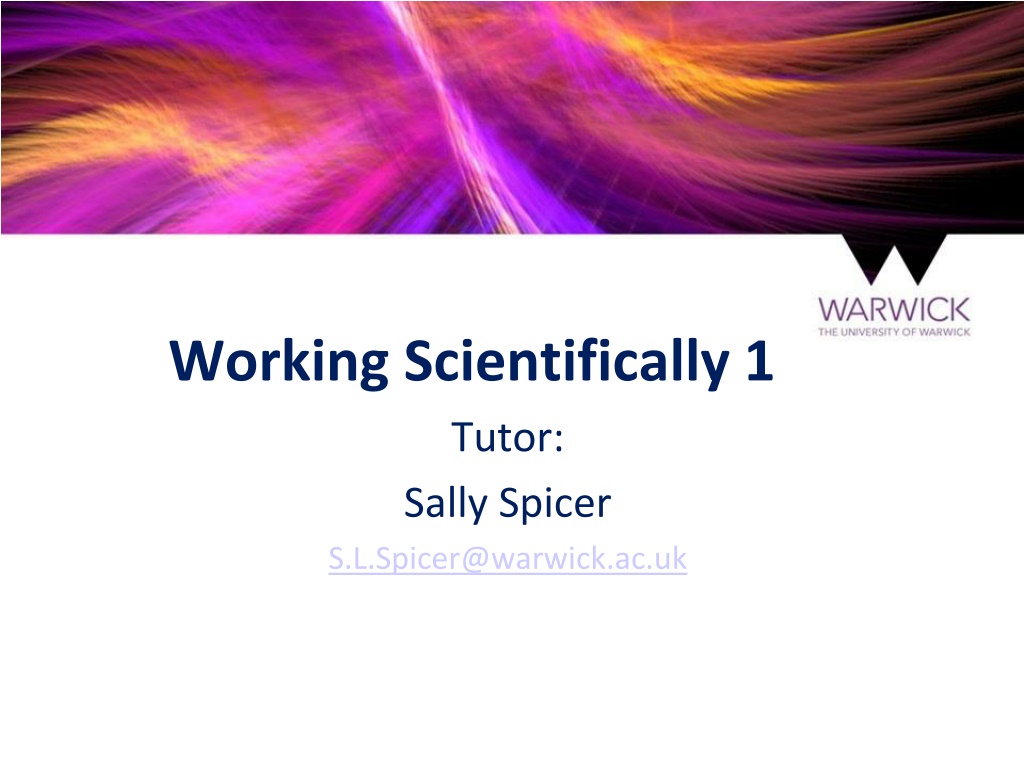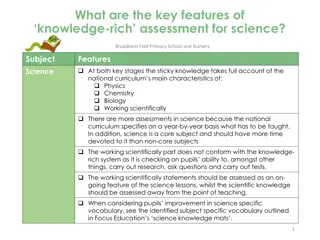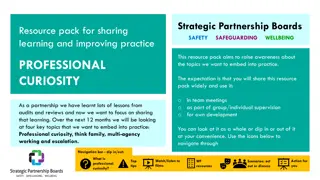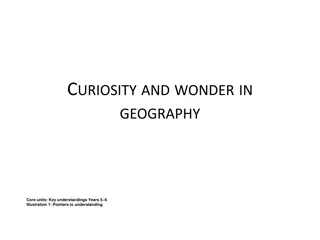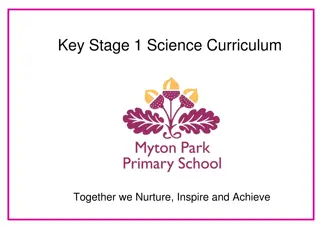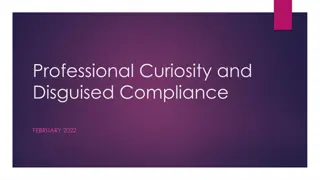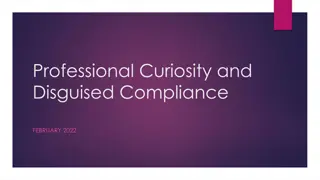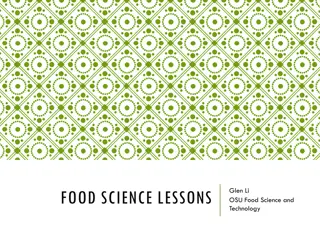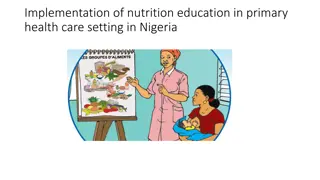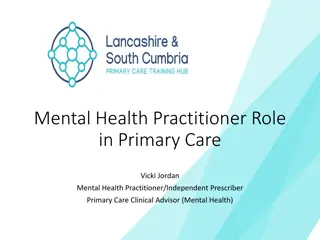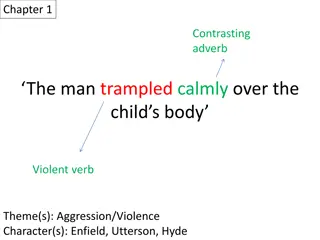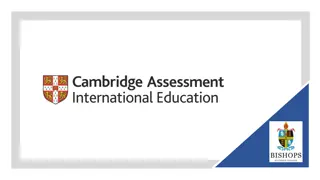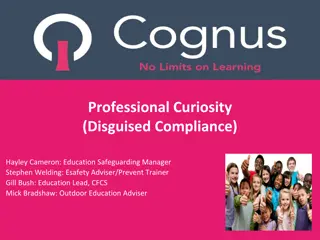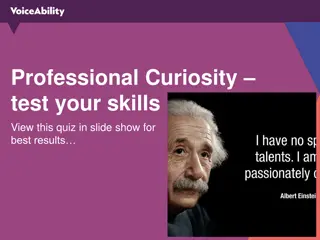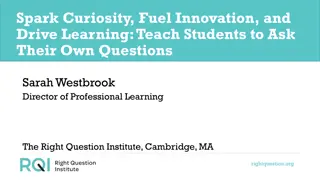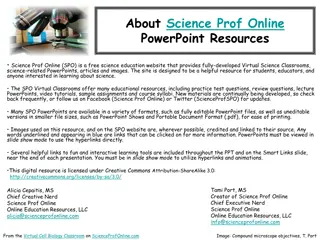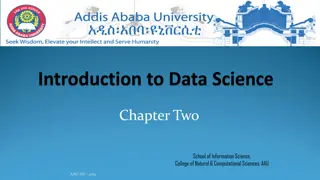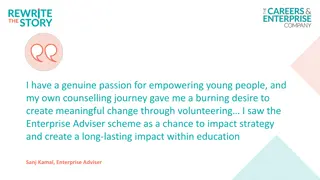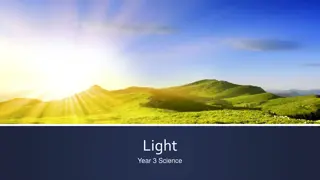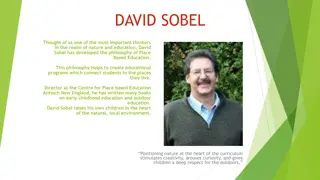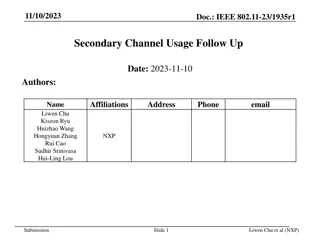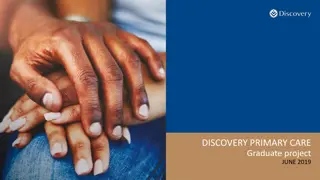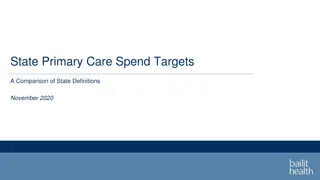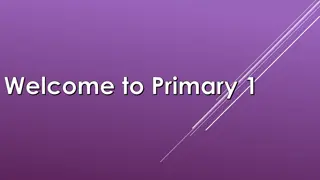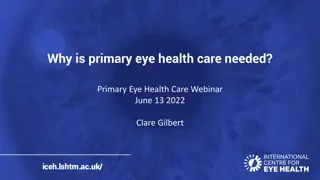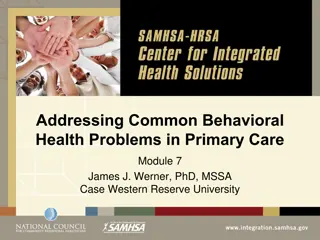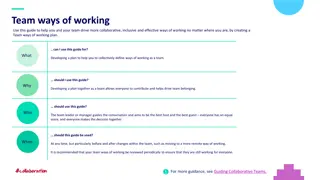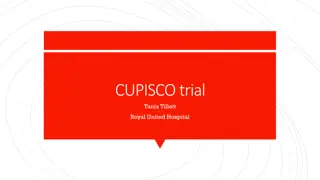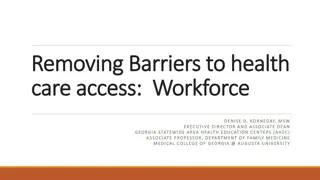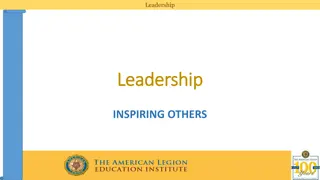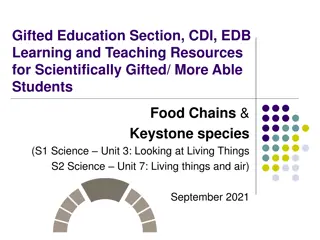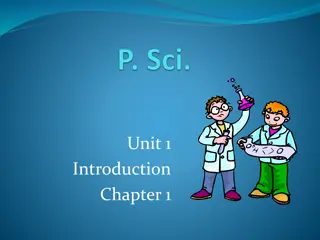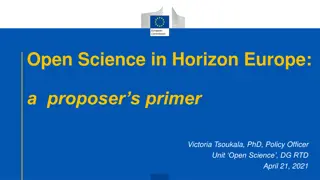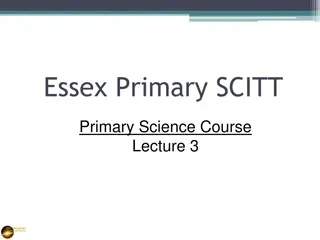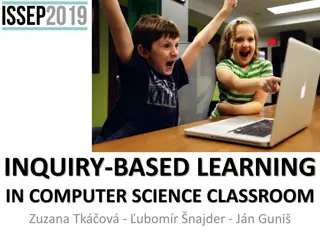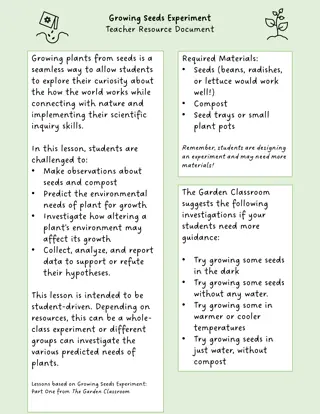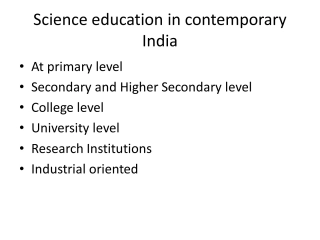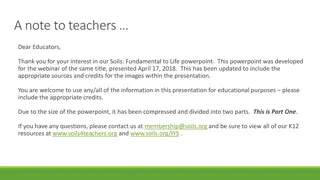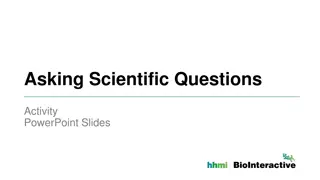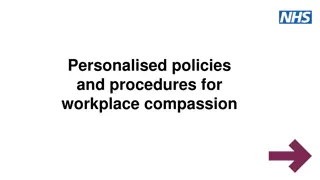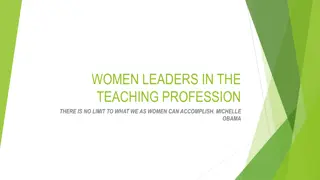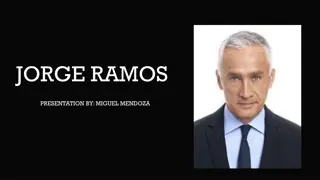Exploring Primary Science: Working Scientifically and Inspiring Curiosity
Delve into the world of primary science with essential aspects such as practical scientific enquiry, enquiry skills, conceptual knowledge, and developing positive attitudes. Learn how to engage young minds in scientific exploration while avoiding stereotypes. Discover the importance of the National Curriculum, observation techniques, and how to foster a love for science in students. Gain insights into teaching science effectively and meeting teacher standards for inspiring learning experiences.
Download Presentation

Please find below an Image/Link to download the presentation.
The content on the website is provided AS IS for your information and personal use only. It may not be sold, licensed, or shared on other websites without obtaining consent from the author. Download presentation by click this link. If you encounter any issues during the download, it is possible that the publisher has removed the file from their server.
E N D
Presentation Transcript
Working Scientifically 1 Tutor: Sally Spicer S.L.Spicer@warwick.ac.uk
Research Archer L. Osborne, J. Dewitt, J., Dillon, J., Wong, B. and Willis, B. (2013) ASPIRES Young people and career aspirations 10-14. London: King s College London Maule L. and Featonby D. (2016) Fifty Shades of Muddy Green Issue 35 : Science in School http://www.scienceinschool.org/content/fifty-shades- muddy-green Ofsted (2015) Improving science with the Lab 13 project: Irchester Community Primary
Teachers Standards TS 1 8 all apply to teaching science, a core subject TS 1 High expectations that inspire, motivate and challenge pupils TS 3 Good subject knowledge and curriculum knowledge TS4 Plan and teach well-structured lessons TS 5 Adapt teaching to respond to strengths and needs of all pupils
Session Overview Important Aspects of Primary Science Working scientifically: types of enquiry National Curriculum -The Importance of Practical Scientific Enquiry Observations and raising questions Guess, prediction or hypothesis?
Primary NC Science 2014 KS1 & 2 Purpose of study all pupils should be taught essential aspects of the knowledge, methods, processes and uses of science should be encouraged to understand how science can be used to explain what is occurring, predict how things will behave, and analyse causes
Important Aspects of Primary Science 1) Enquiry Skills (NC working scientifically) Use methods /strategies of scientists to find answers 2) Conceptual Knowledge and Understanding Learn about important big science ideas Understand the world around them Develop learning skills they will need throughout life ... 3) Developing Social Skills and Positive Attitudes Develop positive attitudes: Curiosity, awe and wonder, co-operation
We all have a responsibility to avoid stereotyping scientists as people in white coats! Brian Cartwright (national lead for science with Ofsted) at NSLC, 21.11.13
Science without practical is like swimming without water (SCORE 2009) Explore Report Question Discuss http://www.score- education.org/media/3674/primary.pdf
Working Scientifically: Skittles! Explore Skittles - arrange 3 5 Skittles on a paper plate or in a petri dish placed on white paper Predict: what will happen when you add water? Observe -what happens? Discuss can you explain what you observe? How many different questions can you come up with? What if? . When would ? How might ? Why is..? Where could ? Report findings/explanations; what could you explore next What basic skills might be developing? Misconceptions? SEND
Aspects of science practical work Basic Skills: choosing and using scientific equipment (eg measuring temperature, using hand lens, measuring distance or time taken) Observations: Using 5 senses, using aids, classifying (eg grouping, sorting, pattern seeking) Illustrations: Focussed activity to demonstrate a particular science idea Investigations: Learning methods & strategies for finding out science ideas
National Curriculum 2014 Working scientifically specifies the understanding of the nature, processes and methods of science for each year group. It should not be taught as a separate strand. working scientifically so that pupils learn to use a variety of approaches to answer relevant scientific questions. Types of scientific enquiry should include: observing over time; pattern seeking; identifying, classifying and grouping; comparative and fair testing (controlled investigations); and researching using secondary sources. Pupils should seek answers to questions through collecting, analysing and presenting data.
The importance of science enquiry National Curriculum for Science 2014 (Working Scientifically) pupils should be encouraged to recognise the power of rational explanation and develop a sense of excitement and curiosity about natural phenomena. to understand how science can be used to explain what is occurring, predict how things will behave, and analyse causes. National Curriculum in England: science programmes of study, Department for Education, 2013; www.gov.uk/government/publications/national- curriculum-in-england-science-programmes-of-study British Values
Developing Observational Skills Circuit of Activities explore using the prompts at the tables A. Feely bags / boxes B. Leaves C. Liquids D. Sealed containers E. RSPCA photo cards What senses and skills have you used? How? Do you have any more questions you would like to ask? How could you find out the answers? How might you record your observations?
Raising /Asking Science Questions Children need encouraging to continue asking questions (post EYFS) Need teaching to identify questions that can/ cannot be investigated Questions to investigate generated after first hand observational experience far better Scaffold: question words, model; develop in pairs from observations, use sorting grid Roden & Archer 2014 Bloom s revised Taxonomy Questions I can investigate now I can t investigate now ? ?
National Curriculum 2014 Working Scientifically KS1 Lower KS2 Upper KS2 use observations and ideas to suggest answers to questions use results to draw simple conclusions, make predictions for new values, suggest improvements, raise further questions use test results to make predictions to set up further comparative and fair tests Use straightforward scientific evidence to support findings Identify scientific evidence used to support or refute ideas or arguments
Science Process Skill Progression Roden and Archer (2014)
Progression in Recording of Observation Skills 1 18 Exemplification of standards. Key Stages 1 and 2
Progression in Recording of Observation Skills 2 Exemplification of standards. Key Stages 1 and 2 SCAA 19
Scientific Knowledge and Understanding Pupils should be taught to use practical scientific methods, processes and skills through the teaching of the programme of study content: Links from observation circuit to the NC (2014) for science: Year 1 Plants; Animals, Including humans Year 1 Everyday materials Year 4 Living things and their habitats; Animals, Including humans Year 4 Sound Year 6 Living things and their habitats
Investigating Magnets Task 1 Explore the collection of magnets (5 mins) Which objects are attracted to the magnet? What properties do they have in common? Task 2 Which is the strongest magnet? Devise a test to find out exactly how strong each magnet is? (15 mins) Does the size, shape, colour or any other factor affect how strong the magnet is? What other tests are there? Groups share ideas 21
Observation-Creative and Cross curricular My Thoughts About Being Blind I see with my ears. I hear the leaves in the tall trees, whispering in the night. I hear the sea, dark and deep, and the splash of the dolphin s leap. I hear the flames crackling and the window frames rattling in the wind. I see with my ears. I see with my hands. I feel the sharp edges, slippery floors, smooth I see with my mouth. I taste the strong black coffee and the thick brown toffee between my teeth. I taste the yellow of the lemon, the green of the melon and the red of the tomato. I taste the orange of the carrot, the purple of the plum, the gold of the sun on my face. I see with my mouth. I see with my nose. I smell the blossoms pearly-grey and hay new mown. I smell the ploughed earth, cows in the byre, the smoky fire. I smell Grandpa s pipe, Gran s lavender room and Mum s faint perfume. I see with my nose. ledges. I feel lemonade in cold canisters, hard wooden banisters. I feel hands to hold, arms on shoulders, faces to touch. I see with my hands. Originally written in Braille by Ruth Hardcastle aged 11
Guess, Prediction or Hypothesis? Young children may only guess what they think will happen by saying I think Literacy ! Reason Connective Older children should also give a reason by saying I think because Their predictions may not need to be scientifically correct Older children should be encouraged to give reasons which are based on their scientific knowledge. The prediction then becomes a hypothesis because children make their reasons explicit and they can then test them out
National Curriculum 2014 Working Scientifically KS1 Lower KS2 Upper KS2 Use their observations and ideas to suggest answers to questions Use results to draw simple conclusions, make predictions for new values, suggest improvements and raise further questions Use test results to make predictions to set up further comparative and fair tests
Predictions Many science activities can be preceded by giving the children an opportunity to predict what they think will happen It is often useful to encourage the children to record a prediction so that they can look back and see if their ideas have changed. Don t make it a chore!
Concept Cartoon: The Snowmans Coat What do you think? Do you agree with any of the children. If so why? Give reasons for your ideas. How could we test our ideas? Starting points for science B. Keough, S Naylor
Make your Predictions and Hypotheses ACTIVITIES Balancing Beam Fruit Tea Bags Spinning Eggs Toothpicks Fizzy water and sultanas Glass and Arrows
Test your Predictions and Hypotheses Before starting the activity: record your groups predictions give reasons for your predictions (hypotheses) Test your predictions After testing your predictions discuss Have you any new ideas or hypotheses as a result of your observations? Do you need to do any further investigations to be more certain about your hypotheses? What previous ideas and science knowledge did you draw upon?
Why encourage children to predict what will happen? Encourages ownership of the investigation and a vested interest in the outcome Encourages them to think ahead and to make plans Helps focus on the key variables by asking them to anticipate the relationship between them Gives clues to the measurements that should be taken Giving reasons for predictions encourages them either to describe their everyday experiences from which they have made a generalisation or to explain the scientific knowledge on which they have based their predictions
Strategies to Help Children make Predictions and Hypotheses Observing children as they play and work with materials Use of productive questions What do you think . ? What could we do to .. ? What do you think will happen if . ? Encourage the children to discuss their ideas
Progression in Predicting KS1 L KS2 U KS2 Roden and Archer (2014) Theory to practice: Children of different ages were investigating how the size of a lump of jelly makes a difference to the time it takes to dissolve. They all thought that the little pieces would dissolve faster than the same amount of jelly in big lumps.
Progression in Predicting I think the little pieces will dissolve first This child has made a simple prediction This child has made a prediction and tried to give a reason but has not given any more information. it does it because it does, Is a common response from younger children I think the little pieces will dissolve first because they are little I think the little pieces will dissolve first because my dad breaks it into little pieces before he makes jelly This child has made a prediction and given a reason based on the everyday experience of watching his dad make a jelly Goldsworthy, A., Feasey, R. (1997), Making Sense of Primary Science Investigations. ASE
Progression in Predicting This child has made a prediction and given a reason where he has used his knowledge of a similar everyday experience and applied it to a new situation I think the little pieces will dissolve first because little bits of sugar dissolve faster than a sugar lump and I think the same will happen with the jelly This child has made a hypothesis which shows he is beginning to think about the way dissolving works I think the little pieces will dissolve first because the water can attack them more easily. KS 2 I think the little pieces will dissolve first because there s more of the surface in touch with the water. This child has made a hypothesis which shows he is developing an understanding of the scientific concept that the greater the surface area means a faster dissolving rate Goldsworthy, A., Feasey, R. (1997), Making Sense of Primary Science Investigations.
Maintaining Curiosity in Science Education Ofsted (2013) More time for scientific enquiry The best schools ensured that pupils had sufficient time to be taught and subsequently develop the skills of scientific enquiry. In the primary schools where pupils were taught science in a discrete lesson once a week, they had sufficient and regular opportunities to carry out practical investigations. As a result, they could revisit and relearn manipulative skills regularly enough for these to develop over time. Some schools taught science within a cross- curricular topic but the best ones still made sure science practical work was weekly.
Considerations Developing the right attitudes through practical science takes time! An attitude of willingness to take account of evidence does not result from a single activity or even several activities may result from extended experiences in which the value of using evidence has been clear or from the example of someone who showed this attitude in their behaviour... They are caught rather than taught ... showing an example of the behaviour in practice is a key action that teachers can take. providing opportunity to make choices that enable them to develop attitudes: reinforcing positive attitudes; and discussing attitude related behaviour. (Harlen & Qualter 2009 cited Harlen, W. 2011 p6 ASE Guide to primary science education) science has not been taught frequently enough for enquiry skills to be developed. The expectation is that science should be taught weekly though no minimum time will be quoted. Brian Cartwright on Maintaining Curiosity, at NSLC, 21.11.13
Plenary Trainees should have a better understanding of: Important Aspects of EY /Primary Science Working scientifically: types of enquiry National Curriculum -The Importance of Practical Scientific Enquiry Observations and raising questions Guess, prediction or hypothesis?
Useful resources http://www.ase.org.uk/home/ PSTT (Primary Science Teaching Trust) https://pstt.org.uk/resources CIEC Working Scientifically in the primary classroom: Progression of Enquiry Skills from EYFS to KS3 www.ciec.org.uk Practical work in primary science (SCORE 2009) free booklet http://www.score-education.org/media/3674/primary.pdf ASE (Association for Science Education) http://www.score-education.org/media/3662/framework.pdf A frame work for practical science (SCORE 2009)
Bibliography Bianchi, L., Feasey, R. (2011) Science Beyond the Classroom Boundaries. For 3 5 year olds. McGraw Hill. Department for Education (2014) Statutory Framework for the Early Years Foundation Stage Setting the standards for learning, development and care for children from birth to five Department for Education (2013) National Curriculum in England: science programmes of study Department for Education (2013) The national curriculum in England; framework document: for teaching 1 September 2014 to 31 August 2015 Department for Education (2013) Teachers Standards Dunne, M. and Peacock, A. (2015) 2nd Edition; Primary Science: A Guide to Teaching Practice; SAGE Harlen, W. ed (2010) ASE Guide to Primary Science Education. New Edition. ASE Hatfield. Howe, A., Davies, D., McMahon, K., Towler, L., Collier, C., Scott, T. ( 2009) 2nd ed Science 5 11. A Guide for Teachers. Routledge. London.
Bibliography cont. Lakin, L. (2013) Developing independent Learning in Science. Practical ideas and activities for 7-12 year olds Open University Press. Ofsted (2013) Maintaining Curiosity A survey into science education in schools; No. 130135 Ofsted (2013) Report Summary; Maintaining Curiosity A survey into science education in schools; No. 130135 Osborne, J., Simon, S., & Collins, S. (2003) Attitudes towards science: a review of the literature and its implications. International Journal of Science Education. 25 (9), 1049 1079 Roden, J. and Archer, J. (2014) Primary Science For Trainee Teachers; SAGE Wilson, H., Mant, J. 2011 What makes an exemplary teacher of science? The pupils perspective. School Science Review. Vol 93:342 ASE Hatfield. Herts. http://www.ase.org.uk/home/
